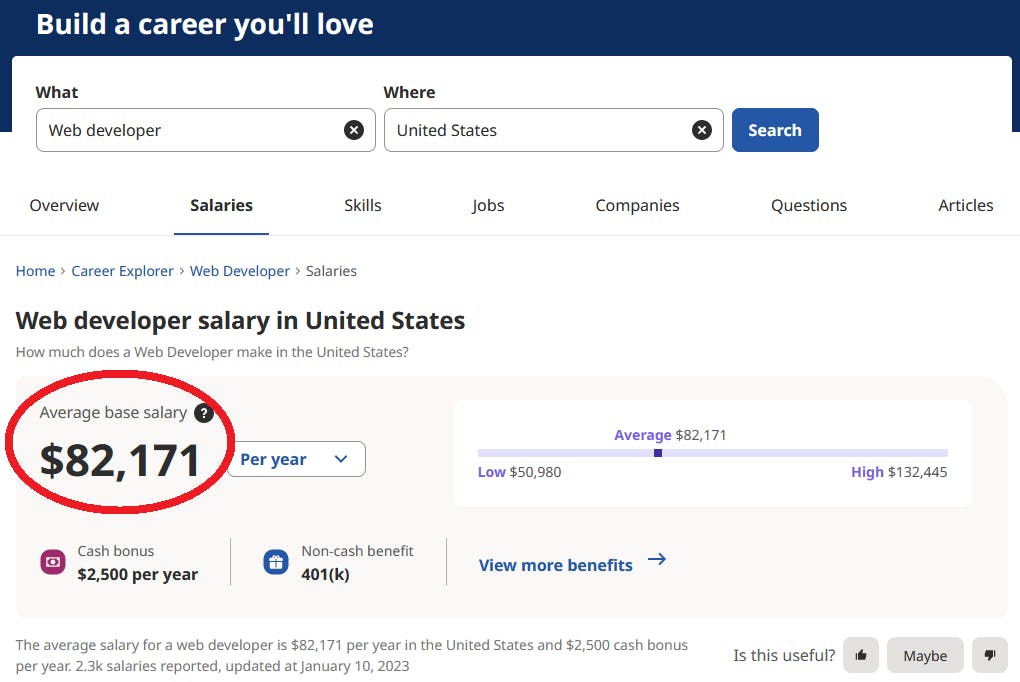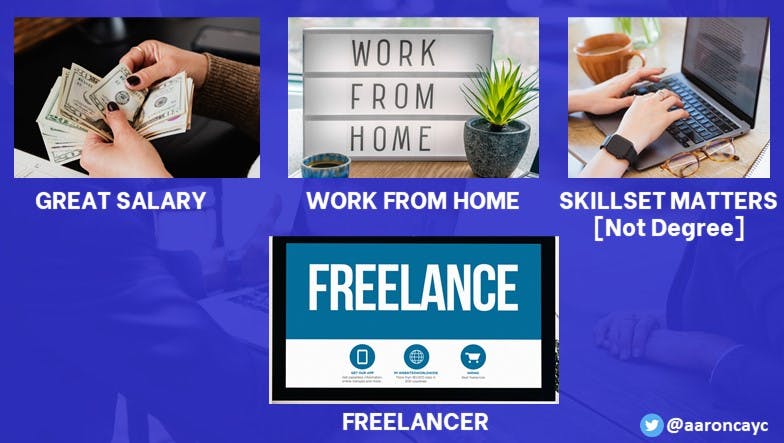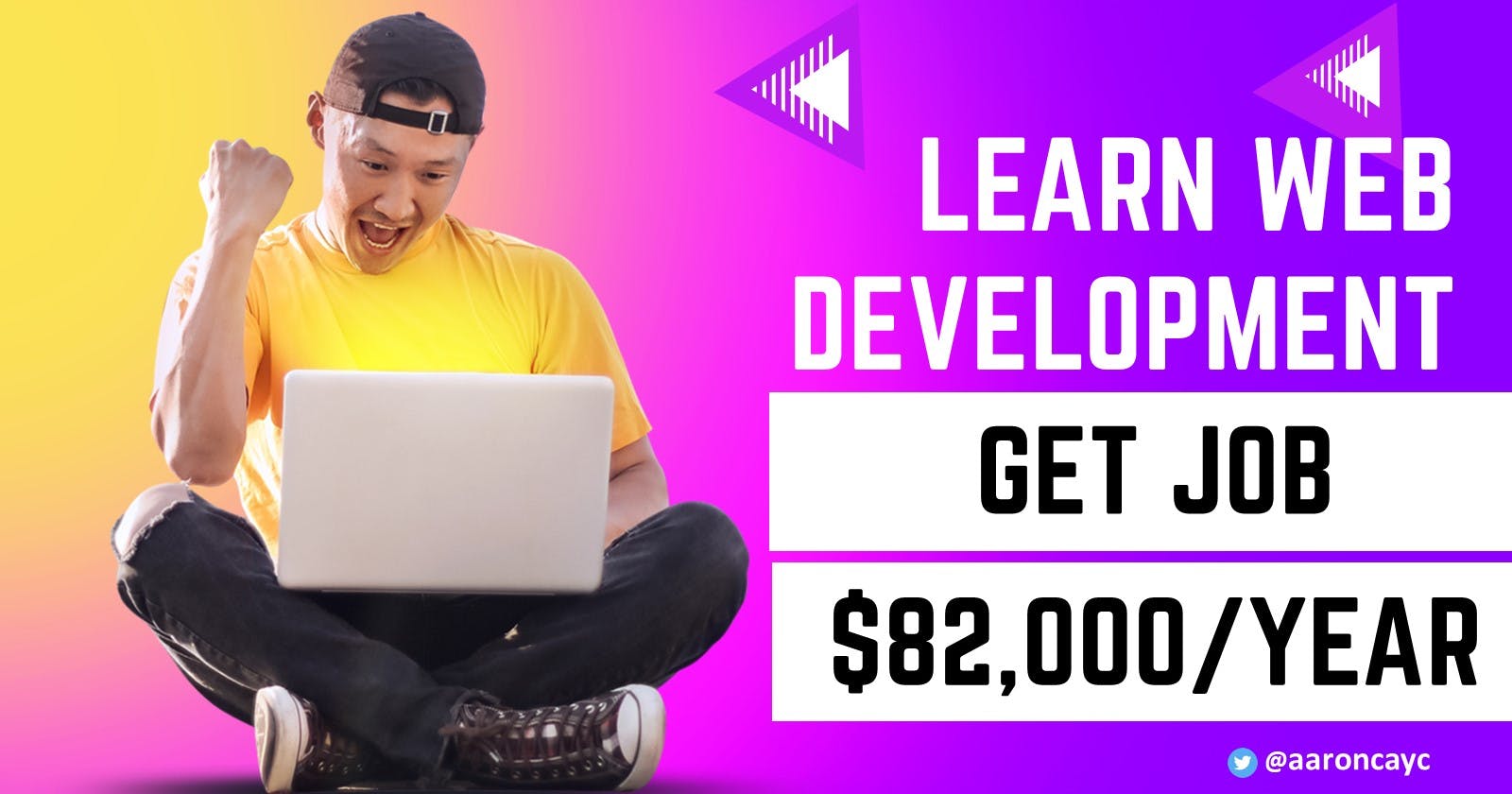Introduction
Have you ever thought? How can you get a web development job with an average salary of $82000 a year?
I wish I had a roadmap when I started my journey to become a web developer so now, I came up with this roadmap to help out those who want to embark on this journey to become a web developer.
What is Web Development

Web development is a popular and in-demand field, with an average salary of over $82000 per year in the United States, according to indeed.com.
The good news is this industry has not been greatly impacted by the COVID-19 pandemic and many web developers have the option to work remotely.

This is one of the reasons why this industry is so popular, as people have the flexibility to work from home or anywhere in the world. However, it can be competitive to break into web development and find your first job.
So, it doesn’t mean as soon as you finish learning programming you will get that much salary. Initially, you will get a junior programmer job with an average salary of $63000 a year or even more. And as you will gain more experience you will get around $110,000 or even more.
Do I Need a Computer Science Degree?

Q1. Now many of you might be thinking do I need a computer science degree?
A1. The answer is: a degree may not always be necessary, but it's important to demonstrate your skills to potential employers. Having a degree in computer science can be beneficial but it's not the only requirement. The good news is, companies like Google, Apple, Microsoft etc. don’t care about your degree as long as you can demonstrate that you have the required knowledge and skills. And certainly, other companies are there that require you to have a computer science degree but this trend is being changed.
Another great thing, if don’t want to work for a company, you can also work as a freelancer. And start working on projects available on freelancing websites. There are tons of projects available on freelancing sites, all you need is a skillset.
So, these are the outstanding benefits of becoming a web developer:

Great Salary
Work From Home [or anywhere in the world]
Skillset is More Important [degree is optional]
Work As a Freelancer
So let me know in the comments below what inspires you the most, among these benefits of becoming a web developer!
Word Of Caution ⚠
Remember, web development is a fast-paced industry, so you often have to learn new things, such as new tools, new languages, and new ways of doing things.
One more important thing, web development, and programming, in general, requires sitting for long hours in front of a computer, if you find that boring and you would rather socialize with people, web development might not be the right career for you. It's better, to be honest with yourself and explore other fields that may be more suitable.
How To Become a Web Developer

Now let’s see what you need to learn, to become a web developer. First of all, you need to decide whether you want to do front-end development or back-end development. Each website has two parts:
1. Front-end and
2. Back-end
1. Front-end Development
Front-end development deals with the visual aspect of a website, while Back-end development empowers it. The front-end developer mainly focuses on the client-side, the part that the end-user interacts with directly, for example:
The layout
Design and
The functionality of the website
A front-end developer should have good knowledge of HTML, CSS, and JavaScript etc. (BWT I’ll talk about more on this in my next blog post)
2. Back-end Development
On the other hand, the Back-end developer mainly focuses on the server-side, the part that the end-user cannot see. They handle the behind-the-scenes functionality, for example:
The server-side scripts
API and
The database
A back-end developer should have good knowledge of languages like Python, Ruby, Java, PHP, and SQL.
3. Full-Stack Development
There are also full-stack developers, who work with both front-end and back-end development. They have good knowledge of both (front-end and Back-end development).
Now web development jobs are divided into three categories:
1. Front-end Development
2. Back-end Development
3. Full-stack Development
If you are starting as a web developer, it's better to focus on one area first (either front-end or back-end) before trying to become a full-stack developer. And once you have some experience in the industry then you can consider going for full-stack development.
To be job-ready, it can take a couple of months to a year, depending on your dedication to learning, the time you invest and your prior experience. A good starting point would be to follow a structured learning plan that includes hands-on experience.
BTW right now not to worry 😟 about all this because, in the next blog post, I’ll share important things with you which will shorten your journey 😊.
What To Choose Front-End or Back-End Development?

By this time, you must be asking yourself. Which route should I go to [should I go for front-end or back-end Development]?
If you ask any successful front-end developer, he will suggest, front-end development is the best.
And if you ask any back-end developer then he would say, you should go for back-end development.
In my option, you should expose yourself to both and that’s why in the next blog post I’ll explain to you in-depth about both areas of web development so that it will be easier for you to decide on your own.
Summary
So, let’s conclude what we learned so far, web development is a popular and in-demand field with great earning potential. While it can be competitive to break into the field. Deciding whether to focus on front-end or back-end development is an important consideration for those starting in web development. It's also important to consider if a career in web development aligns with your interests, skills, and working style, as it requires a long-term commitment, focus, and passion for learning new technologies.
In the next blog post, I will show you a step-by-step process:
What should be your learning path? [which will save you tons of time, resources, and effort]
What programming languages you should learn?
Which tools are required? I will also explain how fast you can accomplish all this.
Consider subscribing to my blog for more updates on my progress journey and I'd help you along the way to shorten your path by sharing more solutions and insights based on my experience.
Subscribe to my Newsletter: https://blogging.aaroncayc.me/newsletter
Follow me on Twitter: https://twitter.com/aaroncayc
Subscribe to Youtube: https://youtube.com/@aaroncayc

